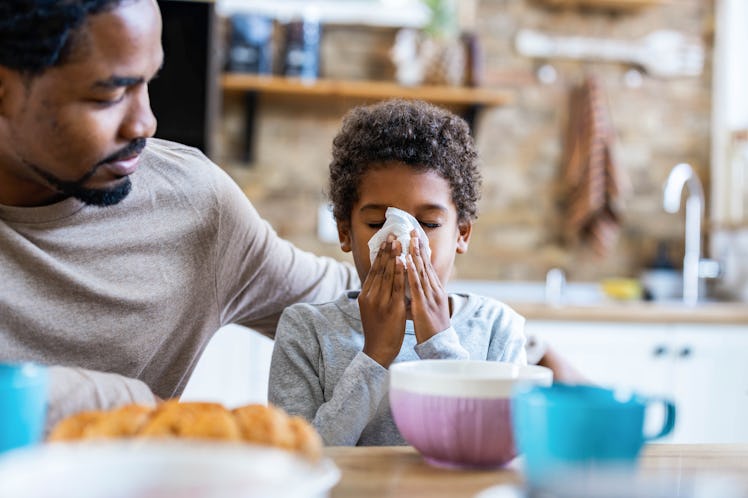How To Convince A Sick Kid To Eat
Kids will eat when they feel like it. Hydration is the real goal.

Yeah, it’s tough for parents to see their child sick. It’s not just the crusty noses and various bodily discharges — though it is that stuff as well — but the human misery. Sick kids have entirely different personalities. They seem to go limp and lose anything resembling curiosity or enthusiasm. And they also seem to be doubly intransigent, especially at lunch or dinner time. Sometimes, they can’t even summon up the energy to eat a favorite meal. This understandably scares parents, but maybe it shouldn’t.
“The old saying ‘starve a cold, feed a fever’ does not play out with children,” says Jarret Patton, M.D., a pediatrician and child health advocate. “When they are ill, they tend to determine what and when they want to eat. For a parent, it tends to cause too much additional stress trying to force your child to eat.”
What to Feed a Sick Toddler Who Won’t Eat
Whether they’re babies or school-aged, sick children often lose their appetites. It’s a sad irony that being ill makes children reluctant to eat or drink — two things they have to do in order to recover quickly. Fighting disease takes calories, and high fever and dehydration is one the most common reasons for kids suffering from the flu to be admitted to the hospital. It doesn’t even have to be fever — vomiting and diarrhea can also quickly dehydrate a sick child. Even a bad cold can be helped with plenty of fluids to replace those lost in mucus production.
In fact, when a kid is sick, parents don’t really need to worry about what they are eating in the short term. They need to worry about what they’re drinking.
“Whether febrile or not, they should drink plenty of fluids. Dehydration can happen quicker when they are sick,” advises Patton. “If they are well hydrated, there is no need to worry about what they eat even if they barely eat anything.”
That said, a sick baby doesn’t need to drink water. All an infant needs to drink is milk or formula, and substituting that for something else can be more dangerous than the cold or flu itself.
If an older kid doesn’t eat, it’s not the end of the world. For many illnesses, the lack of appetite is only a few days, and that appetite will come back with a vengeance. “They will catch up with their food intake as they start to improve,” says Patton. “Offer them food, but don’t force it.”
Listlessness or lack of appetite longer than a few days, however, may warrant speaking to the pediatrician.
If a child does recover their appetite, it’s usually fine to give them whatever they want, even if it’s not very healthy. Parenting has always been the balance of the practical with the ideal. Sure, good nutrition when illness strikes can help the body more efficiently defend itself. Starting a health food diet in the middle of a miserable cold, however, probably won’t be successful; it’s hard enough to get kids to eat well even when they are hungry.
Kids with certain illnesses should avoid certain foods, though. “For most illnesses, it is fine to give them whatever they desire for the relatively short duration of the symptoms,” advises Patton. “However, for gastrointestinal illnesses that include diarrhea, eating easily digestible food like crackers and pastas help. Avoid sugary and fatty foods.”
If a kid doesn’t want to eat, they won’t. It doesn’t mean that parents are failing in their caregiving, or that the kid is self-destructive. It just means they won’t eat. Parents just need to keep kids rested, keep kids hydrated, and give themselves a break, too.
Your Cheat Sheet for a Sick Toddler Who Won’t Eat
- Don’t force the food. Kids can go a few days with low appetites. They’ll make it up when they recover. Any more than a few days, however, and you should call your pediatrician.
- Now is not the time to start the organic kale shakes. Comfort food is fine, but stomach bugs need milder foods, and dairy is not the best options for colds.
- Push fluids. Dehydration is the more serious risk, for a number of illnesses. If parents need to be pushy about anything, it’s water and Pedialyte.
This article was originally published on